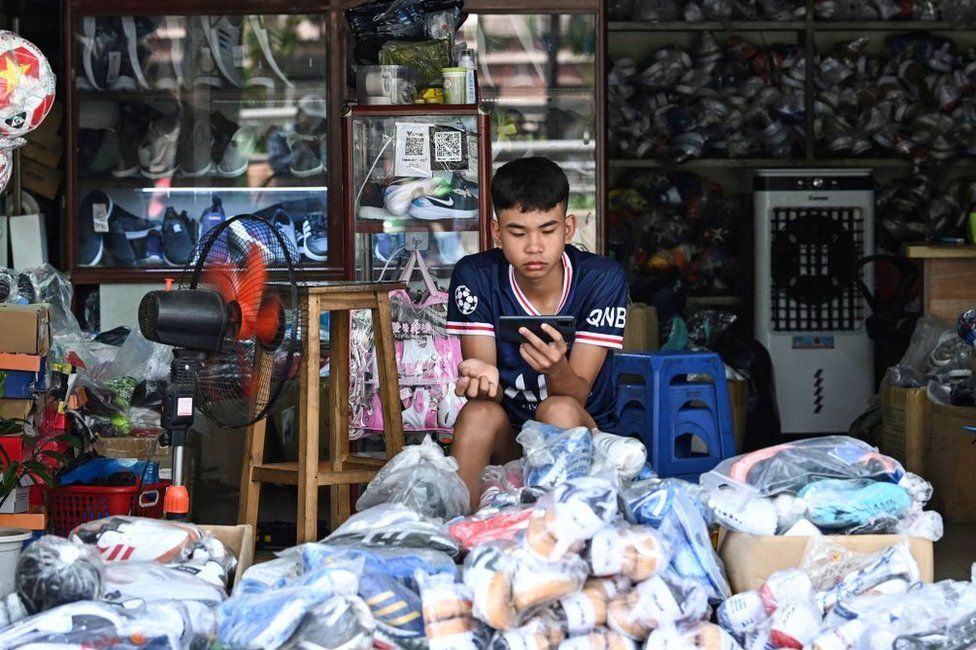When Chinese leader Xi Jinping meets his Vietnamese counterpart, Nguyen Phu Trong on Tuesday, on a state visit to Vietnam, expect a fountain of flowery compliments exalting the historic friendship between these two communist-run neighbours.
Mr Trong visited Beijing a year ago and was given China’s top medal for foreign dignitaries, with Mr Xi describing their relationship as one between “comrades and brothers”, the two countries “connected by mountains and rivers, as close as lips and teeth”.
Vietnam is expected to announce it will join Mr Xi’s “Community of Common Destiny”, a Sino-centric, largely symbolic conception which is widely viewed as a challenge to the prevailing, US-led global order.
That would neatly nudge China one step ahead of the US in their competition for Vietnam’s allegiance, after the US, in a surprise move, had its status elevated to that of “Comprehensive Strategic Partner” during President Joe Biden’s visit to Hanoi in September. This put Washington on the same level as Beijing in Vietnam’s carefully calibrated hierarchy of international partners.
During this week’s visit, China will also be offering its advanced railway technology to help Vietnam upgrade its transport infrastructure. This includes a rail link from southern China to the Vietnamese port of Haiphong, which passes through a region that has some of Vietnam’s richest rare earth deposits – China is the world’s biggest exporter and refiner of the minerals which are essential to produce electric vehicles and renewable energy.
What they will certainly not talk about, at least publicly, is the bitter territorial dispute between them over islands in the South China Sea, nor their acrimonious relationship in the 1970s and 80s, which included a full-scale border war in 1979 that killed thousands of soldiers on both sides. There will also certainly be no mention of China’s long historic colonisation of Vietnam, known there as “nghìn năm bắc thuộc” or 1,000 years of northern occupation, or of Vietnam’s grievances over the impact of Chinese dams on the Mekong river.
But these points of friction are being discussed online in Vietnam, where the internet is less tightly policed than China.
“We only want peace, so President Xi please don’t come,” wrote one Vietnamese Facebook user. “If Xi Jinping removes the nine-dash line, the two countries can become brothers immediately,” wrote another, referring to China’s expansive claim to nearly all of the South China Sea.

Public sentiment in Vietnam can be more fiercely anti-Chinese than anywhere else in South East Asia. It is stirred by the proud nationalism of a country which won its independence after defeating both the French and the Americans, and by historic fear of its giant northern neighbour. This sentiment has always required careful handling by Vietnam’s communist leaders.
In recent years there have been occasional anti-Chinese protests. There were even riots in 2014 which killed several people and destroyed dozens of foreign-owned factories, after China positioned an oil rig in what Vietnam considers its own territorial waters. A few years ago shops began appearing in Hanoi promising to sell only Vietnamese-made goods, and none from China.
Lately both governments have avoided provocations like the 2014 oil rig, cooling public feelings on these issues, but they are never far below the surface. Emotions over the nine-dash line – referred to contemptuously in Vietnam as the cow’s tongue – run so high that this year the authorities banned the movie Barbie because it appeared to show a map with the contested Chinese claim marked on it.
Vietnam has also been reluctant to accept Chinese investment under Mr Xi’s Belt-and-Road initiative, in part because of the risk that those investments may stir up resentment of China’s economic footprint.
And that footprint is huge – far too big for any Vietnamese leader to risk damaging, whatever the public’s views of China.
China is Vietnam’s largest trading partner, with two-way trade approaching $200bn (£159bn) a year. China is the biggest foreign direct investor in Vietnam, dwarfing the US. This despite all the talk of Vietnam as an alternative manufacturing hub for US companies as they seek to reduce their dependence on China. Some of that investment is even driven by the US policy of de-coupling from China, as Chinese companies shift production to Vietnam to try to get around new US restrictions.
On top of that there is still an ideological bond between the leadership of the two countries; Mr Xi and Mr Trong are both hardliners steeped in the authoritarian ideologies of their parties, ill-disposed towards Western democratic values and determined to maintain the iron grip of their parties on political life.

Yet there will always be a profound difference in their strategic outlooks.
China’s is that of an emerging superpower, determined to challenge the unipolarity of the US-led post-Cold War order and to be the dominant influence in its region. Vietnam’s is that of a middle-sized power, determined to extract as much benefit and security as it can by balancing its relations between the US-China rivalry – and with historically close ties to Russia, which it still values.
Mr Trong calls this “bamboo diplomacy”, a flexible foreign policy in line with the four “Nos” that have defined Vietnam’s approach after it ended its pro-Soviet isolation in 1986: no military alliances, no siding with one country against another, no foreign military bases on Vietnamese territory, no use of force in international relations.
The idea is to be friends with all and an enemy of no-one. Yet China will be under no illusions that the upgrade in Vietnam’s relations with the US this year is anything else but a hedge against Chinese influence and its assertiveness in the region.
For Vietnam’s leaders, though not necessarily its people, China must be first among all the many other friendships they seek. But that relationship will always be hostage to events; either a flare-up in the South China Sea, or any other act by China seen as high-handed by the Vietnamese.














35 comments
Very efficiently written information. It will be useful to anybody who usess it, as well as me. Keep up the good work – can’r wait to read more posts.
Your place is valueble for me. Thanks!…
Good day! Do you know if they make any plugins to assist
with SEO? I’m trying to get my blog to rank for some targeted keywords but I’m not seeing very good success.
If you know of any please share. Many thanks! You can read similar article here: Blankets
I keep listening to the newscast talk about receiving free online grant applications so I have been looking around for the top site to get one. Could you advise me please, where could i get some?
Hello my family member! I wish to say that this article is amazing, nice written and include almost all important infos. I?¦d like to look extra posts like this .
Yeah bookmaking this wasn’t a bad determination great post! .
I would like to thnkx for the efforts you have put in writing this blog. I am hoping the same high-grade blog post from you in the upcoming as well. In fact your creative writing abilities has inspired me to get my own blog now. Really the blogging is spreading its wings quickly. Your write up is a good example of it.
Hey just wanted to give you a quick heads up. The words in your article seem to be running off the screen in Opera. I’m not sure if this is a format issue or something to do with browser compatibility but I thought I’d post to let you know. The design look great though! Hope you get the issue resolved soon. Thanks
Hello! Do you know if they make any plugins
to help with Search Engine Optimization? I’m trying to get my site to
rank for some targeted keywords but I’m not seeing very good gains.
If you know of any please share. Thank you! You can read similar art here:
Coaching
What’s Happening i’m new to this, I stumbled upon this I’ve found It absolutely helpful and it has aided me out loads. I hope to contribute & aid other users like its helped me. Great job.
Your place is valueble for me. Thanks!…
I’m really inspired with your writing talents and also with the format to your weblog. Is that this a paid theme or did you customize it your self? Anyway stay up the excellent quality writing, it is rare to see a great blog like this one today. I like theprideceo.com ! My is: Instagram Auto follow
I’m really impressed together with your writing talents and also with the structure in your blog. Is that this a paid topic or did you modify it yourself? Anyway keep up the excellent high quality writing, it is uncommon to look a great blog like this one today. I like theprideceo.com ! My is: Affilionaire.org
Normally I do not read article on blogs, but I wish to say that this write-up very forced me to try and do it! Your writing style has been amazed me. Thanks, very nice article.
Hey there! This is my first comment here so I just wanted to give a quick shout out and tell you I truly enjoy reading your posts. Can you suggest any other blogs/websites/forums that go over the same subjects? Appreciate it!
You really make it appear so easy with your presentation however I in finding this topic to be really one thing which I feel I might by no means understand. It seems too complicated and very wide for me. I’m having a look forward on your subsequent put up, I will try to get the dangle of it!
Regards for this howling post, I am glad I found this website on yahoo.
Most of what you point out is astonishingly appropriate and it makes me ponder why I had not looked at this in this light previously. This particular piece really did turn the light on for me personally as far as this specific topic goes. However at this time there is actually one particular position I am not necessarily too comfortable with and whilst I try to reconcile that with the actual main idea of your issue, let me see exactly what the rest of the visitors have to say.Very well done.
can i buy generic clomid pill can i purchase clomid without insurance where to buy cheap clomiphene no prescription says: how to buy clomiphene without prescription get generic clomid pills can you get clomiphene without rx can i order clomiphene pills
More content pieces like this would insinuate the web better.
This is the tolerant of delivery I recoup helpful.
Good info. Lucky me I reach on your website by accident, I bookmarked it.
buy generic azithromycin for sale – how to buy tindamax buy flagyl no prescription
buy generic rybelsus – periactin generic periactin 4mg ca
buy motilium sale – purchase cyclobenzaprine generic buy cyclobenzaprine 15mg generic
inderal generic – plavix order methotrexate medication
buy augmentin 625mg generic – https://atbioinfo.com/ buy generic acillin over the counter
buy nexium – https://anexamate.com/ purchase esomeprazole online
coumadin usa – https://coumamide.com/ losartan 25mg price
mobic us – tenderness mobic 7.5mg cost
I really like meeting utile information , this post has got me even more info! .
cost deltasone 5mg – https://apreplson.com/ prednisone without prescription
buy ed pills medication – buy ed pills cheap best ed medication
amoxil for sale – purchase amoxil for sale cheap amoxil without prescription
generic fluconazole 100mg – https://gpdifluca.com/# order forcan for sale